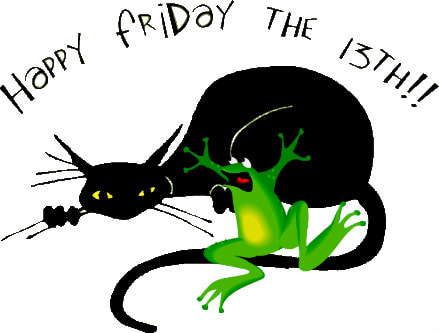Triskaidekaphobia, from Greek; the tris means "three", kai mean "and", deka means "ten", and phobos means "fear" or "morbid fear"...the fear of the number 13. Paraskevidekatriaphobia is fear of Friday the Thirteenth...paraskevi in Greek means Friday. It is estimated that 17 to 21 million people, in the US alone, suffer from fear of Friday the 13th. In the Gregorian calendar, Friday the 13th will occur at least once a year and as many as three times each year.
The origins of Friday the 13th remain unclear, and there isn't any mention of it before the 19th century. But superstitions surrounding the number 13 date back to at least 1700 BC. In the ancient Babylon's Code of Hammurabi, dating to 1772 BC, the number 13 is omitted in the list of laws. There is also a long-standing myth, dating from the Last Supper, that if thirteen people dine together, at least one of them will die that year. The number 13 is so disliked that many cities do not have a 13th Street or a 13th Avenue. Many buildings omit a 13th floor. Friday has long been considered an unlucky day and is mentioned in Chaucer's The Canterbury Tales as a day of ill-luck and misfortune. The first recorded reference, in English, to Friday the 13th dates to the 1869 biography of Gioachino Rissini, written by Henry Sutherland Edwards. He writes: "Rossini was surrounded to the last by admiring and affectionate friends; Why Friday the 13th Is Unlucky." Nathaniel Lachenmeyer, author of "Thirteen: the story of the world's most popular superstition" states that references to Friday the 13th are nonexistent before 1907; the popularity of the superstition stemming from the publication of Thomas W, Lawson's novel, "Friday the Thirteenth." This ominous day was also mentioned in the 2003 novel, "The DaVinci Code." While the arrest of the Grand Master of the Knights Templar, did occur on Friday the Thirteen, the connection between this day and bad luck is thought to be a modern-day interpretation of the events.
In 2008, The Centre for Dutch Insurance Statistics, showed that they had fewer accidents, reports of fire, or theft, on Friday the 13th as compared to other Fridays during the year. Perhaps because more people opt to stay home on this day. But a 1993 study in the British Medical Journal showed a significant increase in level of traffic-related incidents on Friday the Thirteen, as compared to other Fridays in the UK. Traditionally, Friday the Thirteenth is a calm day for the US Stock Market where the average gains are 0.2 percent or less.
Here are some scary things that occurred on Friday the Thirteenth: 1. Thousands of Crusaders were captured and imprisoned in 1307. 2. In 1923, the state of Tennessee passed a law making it illegal to teach the study of evolution. 3. Alfred Hitchcock, the film director with a seriously twisted brain, was born in 1899. 4. In September of 1940, the Nazis dropped a bomb on Buckingham Palace as the Royal Family was taking time for tea.
5. On this day in 1970, a cyclone in Bangladesh killed 500,000 people. 6. In 1989, a deadly virus crashed IBM computers in Britain, terrifying people and deleting loads of data that could never be retrieved. 7. The cruise ship Costa Concordia sank in 2012, killing over 30 people. 8. Over $900 million dollars is lost every Friday the Thirteen because people are scared to travel and work on this day.
Now how about a few good things that happened on Friday the Thirteenth?
1. The 2004 Summer Olympics in Greece held their opening ceremony. 2. In October of 1967, US President Lyndon B. Johnson signed an executive order meant to rid the US government of gender discrimination. 3. Evelyn Pinckert Kilgore, the first female flight instructor, received her license in October, 1939. 4. The famous HOLLYWOOD sign was unveiled in July, 1923. It was expected to last a year or so. 5. Henry Rowe Schoolcraft, an American geologist, discovered the source of the mighty Mississippi River in July, 1932. 6. October, 1932, French-Jewish artillery Captain, Alfred Dreyfus, who was wrongly convicted of espionage was exonerated and returned to military duty. French novelist Emile Zola, wrote the stirring account of these events in "The Dreyfus Affair." 7. American statesman and inventor, Benjamin Franklin wrote his now-famous quote in a letter to Jean-Baptiste Leroy, "Nothing is certain but death and taxes" in November, 1789.
No matter whether or not you're superstitious, I hope you have a wonderful Friday the Thirteen. The good news is, that every Friday the Thirteenth is followed by a Saturday the Fourteenth. So enjoy your weekend. And I invite you all back here on Monday.
P.S. Just in case you're wondering, the next Friday the Thirteenth won't occur until April, 2018.

 RSS Feed
RSS Feed